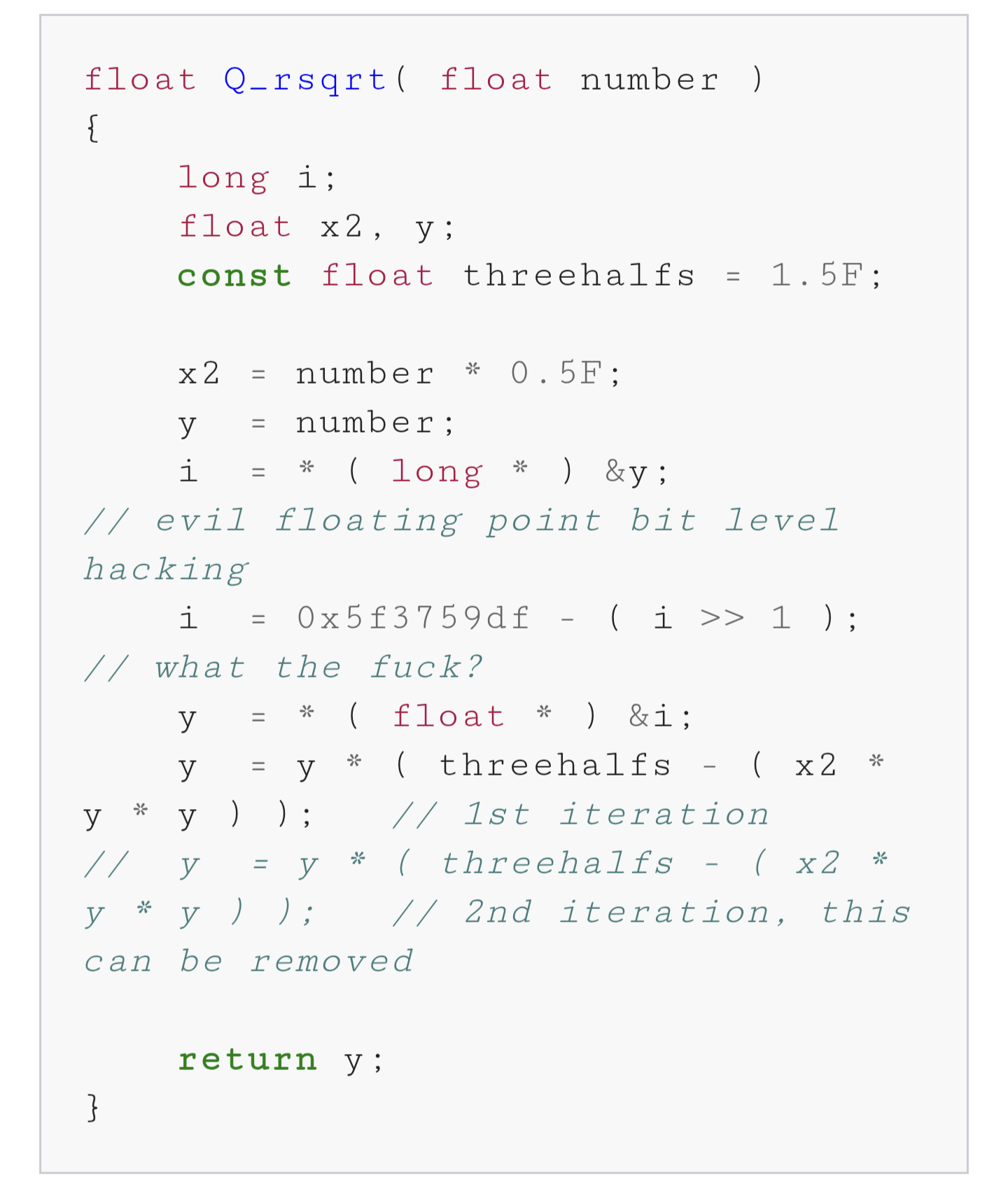I don’t think that casting a range of bits as some other arbitrary type “is a bug nobody sees coming”.
C++ compilers also warn you that this is likely an issue and will fail to compile if configured to do so. But it will let you do it if you really want to.
That’s why I love C++
Why use a strongly typed language at all, then?
Sounds unnecessarily restrictive, right? Just cast whatever as whatever and let future devs sort it out.
$myConstant = ‘15’;
$myOtherConstant = getDateTime();
$buggyShit = $myConstant + $myOtherConstant;Fuck everyone who comes after me for the next 20 years.
“C++ compilers also warn you…”
Ok, quick question here for people who work in C++ with other people (not personal projects). How many warnings does the code produce when it’s compiled?
I’ve written a little bit of C++ decades ago, and since then I’ve worked alongside devs who worked on C++ projects. I’ve never seen a codebase that didn’t produce hundreds if not thousands of lines of warnings when compiling.
My team uses the -Werror flag, so our code won’t compile if there are any warnings at all.
I put -Werror at the end of my makefile cflags so it actually treats warnings as errors now.
A production code should never have any warning left. This is a simple rule that will save a lot of headaches.
Neither should your development code, except for the part where you’re working on.
I mostly see warnings when compiling source code of other projects. If you get a warning as a dev, it’s your responsibility to deal with it. But also your risk, if you don’t. I made it a habit to fix every warning in my own projects. For prototyping I might ignore them temporarily. Some types of warnings are unavoidable sometimes.
If you want to make yourself not ignore warnings, you can compile with
-Werrorif using GCC/G++ to make the compiler a pedantic asshole that doesn’t compile until you fix every fucking warning. Not advisable for drafting code, but definitely if you want to ship it.Except when you have to cast size_t on int and vice versa (for “small” numbers). I hate that warning.
You shouldn’t have any warnings. They can be totally benign, but when you get used to seeing warnings, you will not see the one that does matter.
I know, that’s why it bothered me that it seemed to be “policy” to just ignore them.
0 in our case, but we are pretty strict. Same at the first place I worked too. Big tech companies.
Ideally? Zero. I’m sure some teams require “warnings as errors” as a compiler setting for all work to pass muster.
In reality, there’s going to be odd corner-cases where some non-type-safe stuff is needed, which will make your compiler unhappy. I’ve seen this a bunch in 3rd party library headers, sadly. So it ultimately doesn’t matter how good my code is.
There’s also a shedload of legacy things going on a lot of the time, like having to just let all warnings through because of the handful of places that will never be warning free. IMO its a way better practice to turn a warning off for a specific line.. Sad thing is, it’s newer than C++ itself and is implementation dependent, so it probably doesn’t get used as much.
I’ve seen this a bunch in 3rd party library headers, sadly. So it ultimately doesn’t matter how good my code is.
Yeah, I’ve seen that too. The problem is that once the library starts spitting out warnings it’s hard to spot your own warnings.
Yuuup. Makes me wonder if there’s a viable “diaper pattern” for this kind of thing. I’m sure someone has solved that, just not with the usual old-school packaging tools (e.g. automake).
I work on one of the larger c++ projects out there (20 to 50 million lines range) and though I don’t see the full build logs I’ve yet to see a component that has a warning.
Depends on the age of the codebase, the age of the compiler and the culture of the team.
I’ve arrived into a team with 1000+ warnings, no const correctness (code had been ported from a C codebase) and nothing but C style casts. Within 6 months, we had it all cleaned up but my least favourite memory from that time was “I’ll just make this const correct; ah, right, and then this; and now I have to do this” etc etc. A right pain.
So, did you get it down to 0 warnings and manage to keep it there? Or did it eventually start creeping up again?
Once we were at zero warnings, we enabled warnings as errors, despite the protestation of the grognards on the team.
I’m not the person you’re asking but surely they just told the compiler to treat warnings as errors after that. No warnings can creep in then!
Ignoring warnings is really not a good way to deal with it. If a compiler is bitching about something there is a reason to.
A lot of times the devs are too overworked or a little underloaded in the supply of fucks to give, so they ignore them.
In some really high quality codebases, they turn on “treat warnings as errors” to ensure better code.
I know that should be the philosophy, but is it? In my experience it seems to be normal to ignore warnings.
The problem is that it’s undefined behavior. Quake fast inverse square root only works before the types just happen to look that way. Because the floats just happens to have that bit arrangement. It could look very different on other machines! Nevermind that it’s essentially always exactly the same on most architectures. So yeah. Undefined behavior is there to keep your code usable even if our assumptions about types and memory change completely one day.
There are no medals waiting for you by writing overly clever code. Trust me, I’ve tried. There’s no pride. Only pain.
Debugging code is always harder that writing it in the first place. If you make it as clever as you can, you won’t be clever enough to debug it.
Some junior will call it ”skill issues” and then write the most unreadable code ever.
Not only that, but everyone who sees that code later is going to waste so much time trying to understand it. That includes future you.
That what comments and documentation are for.
A yes, comments.
int flubTheWozat(void *) { for (int i=0; i<4; i++) { lfens += thzn[i] % ugy; // take mod of thnz[i] with ugy and add to lefens. } return (lfens % thzn[0]) == 4; // return if it's 4ish }Haha, meaningful, informative comments that make it easier to understand the code of course. ;)
But I must o p t i m i z e! ó_ò
Yes, let’s spend two hours on figuring out optimal values of preallocating a vector for your specific use-case. It’s worth the couple of microseconds saved! Kleinvieh macht auch Mist.
It really depends on your field. I’m doing my master’s thesis in HPC, and there, clever programming is really worth it.
Well as long you know what you’re doing and weigh the risks with the benefits you’re probably ok.
In my experience in the industry, there’s little benefit in pretending you’re John Carmack writing fast inverse square root. Understanding what you wrote 6 months ago outweighs most else.
Aand what is wrong with that?
C lets you shoot yourself in the foot.
C++ lets you reuse the bullet.
C is dangerous like your uncle who drinks and smokes. Y’wanna make a weedwhacker-powered skateboard? Bitchin’! Nail that fucker on there good, she’ll be right. Get a bunch of C folks together and they’ll avoid all the stupid easy ways to kill somebody, in service to building something properly dangerous. They’ll raise the stakes from “accident” to “disaster.” Whether or not it works, it’s gonna blow people away.
C++ is dangerous like a quiet librarian who knows exactly which forbidden tomes you’re looking for. He and his… associates… will gladly share all the dark magic you know how to ask about. They’ll assure you that the power cosmic would never, without sufficient warning, pull someone inside-out. They don’t question why a loving god would allow the powers you crave. They will show you which runes to carve, and then, they will hand you the knife.
I’m all for having the ability to do these shenanigans in principle, but prefer if they are guarded in an
unsafeblock.What do you mean I’m not supposed to add 0x5f3759df to a float casted as a long, bitshifted right by 1?
//what the fuck?They know. It’s a comment from the code.


But it will let you do it if you really want to.
Now, I’ve seen this a couple of times in this post. The idea that the compiler will let you do anything is so bizarre to me. It’s not a matter of being allowed by the software to do anything. The software will do what you goddamn tell it to do, or it gets replaced.
WE’RE the humans, we’re not asking some silicon diodes for permission. What the actual fuck?!? We created the fucking thing to do our bidding, and now we’re all oh pwueez mr computer sir, may I have another ADC EAX, R13? FUCK THAT! Either the computer performs like the tool it is, or it goes the way of broken hammers and lawnmowers!
Yeah, but there’s some things computers are genuinely better at than humans, which is why we code in the first place. I totally agree that you shouldn’t ever be completely controlled by your machine, but strong nudging saves a lot of trouble.
I understand the idea. But many people have hugely mistaken beliefs about what the C[++] languages are and how they work. When you write ADC EAX, R13 in assembly, that’s it. But C is not a “portable assembler”! It has its own complicated logic. You might think that by writing ++i, you are writing just some INC [i] ot whatnot. You are not. To make a silly example, writing
int i=INT_MAX; ++i;you are not telling the compiler to produce INT_MIN. You are just telling it complete nonsense. And it would be better if the compiler “prevented” you from doing it, forcing you to explain yourself better.I get what you’re saying. I guess what I’m yelling at the clouds about is the common discourse more than anything else.
If a screw has a slotted head, and your screwdriver is a torx, few people would say that the screwdriver won’t allow them to do something.
Computers are just tools, and we’re the ones who created them. We shouldn’t be submissive, we should acknowledge that we have taken the wrong approach at solving something and do it a different way. Just like I would bitch about never having the correct screwdriver handy, and then go look for the right one.
New copypasta just dropped
Yup, I am with you on this one
Ok gramps now take your meds and off you go to the retirement home

Stupid cloud, who’s laughing now?
Soldiers are supposed to question potentially-illegal orders and refuse to execute them if their commanding officer can’t give a good reason why they’re justified. Being in charge doesn’t mean you’re infallible, and there are plenty of mistakes programmers make that the compiler can detect.
I get the analogy, but I don’t think that it’s valid. Soldiers are, much to the chagrin of their commanders, sentient beings, and should question potentially illegal orders.
Where the analogy doesn’t hold is, besides my computer not being sentient, what I’m prevented from doing isn’t against the law of man.
I’m not claiming to be infallible. After all to err is human, and I’m indeed very human. But throw me a warning when I do something that goes against best practices, that’s fine. Whether I deal with it is something for me to decide. But stopping me from doing what I’m trying to do, because it’s potentially problematic? GTFO with that kinda BS.
This comment makes me want to reformat every fucking thing i use and bend it to -my- will like some sort of technomancer
when life gives you restrictive compilers, don’t request permission from them! make life take the compilers back! Get mad! I don’t want your damn restrictive compilers, what the hell am I supposed to do with these? Demand to see life’s manager! Make life rue the day it thought it could give BigDanishGuy restrictive compilers! Do you know who I am? I’m the man who’s gonna burn your house down! With the compilers! I’m gonna get my engineers to invent a combustible compiler that burns your house down!
I will botton for my rust compiler, I’m not going to argue with it.
I used to love C++ until I learned Rust. Now I think it is obnoxious, because even if you write modern C++, without raw pointers, casting and the like, you will be constantly questioning whether you do stuff right. The spec is just way too complicated at this point and it can only get worse, unless they choose to break backwards compatibility and throw out the pre C++11 bullshit
Depending on what I’m doing, sometimes rust will annoy me just as much. Often I’m doing something I know is definitely right, but I have to go through so much ceremony to get it to work in rust. The most commonly annoying example I can think of is trying to mutably borrow two distinct fields of a struct at the same time. You can’t do it. It’s the worst.
I suppose it’s a matter of experience and practise. The more you wotk with it the better you get. As usual with all things one can learn.
The question becomes, then, if I spend 5 years learning and mastering C++ versus rust, which one is going to help me produce a better product in the end?
Removed by mod
I actually do like that C/C++ let you do this stuff.
Sometimes it’s nice to acknowledge that I’m writing software for a computer and it’s all just bytes. Sometimes I don’t really want to wrestle with the ivory tower of abstract type theory mixed with vague compiler errors, I just want to allocate a block of memory and apply a minimal set rules on top.
100%. In my opinion, the whole “build your program around your model of the world” mantra has caused more harm than good. Lots of “best practices” seem to be accepted without any qualitative measurement to prove it’s actually better. I want to think it’s just the growing pains of a young field.
Even with qualitative measurements they can do stupid things.
For work I have to write code in C# and Microsoft found that null reference exceptions were a common issue. They actually calculated how much these issues cost the industry (some big number) and put a lot of effort into changing the language so there’s a lot of warnings when something is null.
But the end result is people just set things to an empty value instead of leaving it as null to avoid the warnings. And sure great, you don’t have null reference exceptions because a value that defaulted to null didn’t get set. But now you have issues where a value is an empty string when it should have been set.
The exception message would tell you exactly where in the code there’s a mistake, and you’ll immediately know there’s a problem and it’s more likely to be discovered by unit tests or QA. Something that’s an value that’s supposed to be set may not be noticed for a while and is difficult to track down.
So their research indicated a costly issue (which is ultimately a dev making a mistake) and they fixed it by creating an even more costly issue.
There’s always going to be things where it’s the responsibility of the developer to deal with, and there’s no fix for it at the language level. Trying to fix it with language changes can just make things worse.
People just think that applying arbitrary rules somehow makes software magically more secure, like with rust, as if the compiler won’t just “let you” do the exact same fucking thing if you type the
unsafekeywordYou don’t need
unsafeto write vulnerable code in rust.You don’t even need
unsafe, you can just take user input and execute it in a shell and rust will let you do it. Totally insecure!
C++ is kinky that way. You can consent to all manner of depraved programming patterns. Great for use in personal life, but maybe not appropriate for the office.
But does it have cargo-mommy :P


TIL there’s more than one kind of “vibe” coding.
https://github.com/Shadlock0133/cargo-vibe
I thought it was a joke, but this is actually viable and even configurable
By default,
cargo-vibewill, on success, vibe full strength for 3 seconds.You can change that by setting
CARGO_VIBE_PATTERNenvironment variable. For example, to set it vibe for 1.5 second on 20% strength, you can do:CARGO_VIBE_PATTERN="0.2 1.5s" cargo vibe <cmd>You can also set full patterns of vibes to run, by separating them with slashes
/. Here is one example:CARGO_VIBE_PATTERN="0.4 1s/0.6 1s/0.8 0.75s/1.0 0.25s"Wait, there’s more! https://github.com/funkeleinhorn/cargo-shock
To let Cargo Shock trigger your shock collar use:
cargo shock buildTo use it everytime you can
alias cargo="cargo shock".Cargo Shock can also be combined with other tools like Cargo Mommy and Cargo Vibe like this:
cargo mommy vibe shock build ...And they have a really slick site: https://openshock.org/
As it should be. Airbags should go off when you crash, not when you drive near the edge of a cliff.
No need to cast as any types at all just work with bits directly /s














